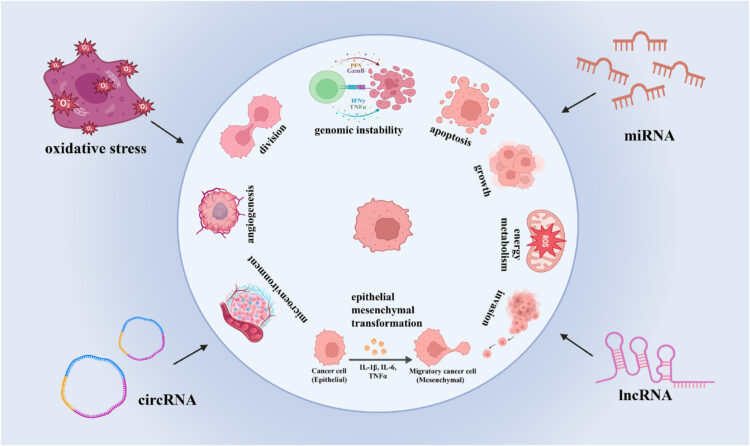Recent developments in cancer research have spotlighted the intricate relationships between non-coding RNAs and oxidative stress, revealing their significant roles in cancer progression. This connection is crucial not only for understanding the complex mechanisms driving this disease but also for paving new avenues in targeted therapies. A new review published in the journal Genes & Diseases offers deeper insights into how these molecular entities interact during various stages of cancer development, including cell growth, invasion, and overall tumor evolution.
Non-coding RNAs, which encompass a range of RNA molecules that do not translate into proteins, are emerging as pivotal players in genetically driven malignancies. These RNAs are capable of modulating messenger RNA (mRNA) expression and impacting protein interactions, thus influencing cellular activities. The ability of non-coding RNAs to fine-tune these genetic networks allows cancer cells to bypass traditional cellular controls, thereby enhancing their growth potential and adaptability in tumor microenvironments.
Understanding the triggers for oxidative stress has become a focal point in cancer biology. This type of stress arises from an excess of reactive oxygen species (ROS), which can lead to cellular damage, genomic instability, and ultimately, tumor formation. However, ROS also represent a double-edged sword; while they contribute to cancer pathology, they can also be exploited for therapeutic mechanisms. Non-coding RNAs are uniquely positioned to modify oxidative stress responses, presenting them as promising targets for developing precision-based cancer treatments.
Angiogenesis, the process by which tumors stimulate the growth of new blood vessels to secure nutrient supply, is significantly affected by oxidative stress. Non-coding RNAs are implicated in regulating this process, influencing how tumors manipulate their environments to favor survival and proliferation. Additionally, autophagy, a cellular process that can either impede or support cancer progression depending on the cellular context, is also under the regulatory influence of non-coding RNAs. Researchers have identified pathways where these RNAs adjust cellular metabolism, thereby enhancing the cancer cell’s resilience against therapeutic interventions.
The implications of non-coding RNA activity extend into metabolic reprogramming, particularly concerning how cancer cells adapt their energy production systems. The Warburg effect describes this metabolic shift, wherein cancer cells favor glycolysis for energy, even in the presence of adequate oxygen. Non-coding RNAs facilitate this metabolic transition, allowing tumors to sustain rapid growth while evading damage from oxidative stress. Understanding these complex interactions provides a fertile ground for new therapeutic strategies aimed at restoring metabolic balance in cancer cells.
Research has also highlighted the roles of various non-coding RNA classes, such as circular RNAs (circRNAs), long non-coding RNAs (lncRNAs), and microRNAs (miRNAs), in the modulation of oxidative stress pathways. These molecules interact intricately with ROS generation pathways, potentially disrupting the chain of events crucial for cancer progression. The links found between these non-coding RNAs and oxidative stress underscore the nuances of tumor biology and highlight potential therapeutic targets that can be harnessed in future cancer treatments.
As investigations into the interplay between non-coding RNAs and oxidative stress advance, the prospects for developing novel cancer therapies that are both targeted and efficient increase significantly. The potential to utilize non-coding RNA modulation could lead to breakthroughs in personalized medicine and interventions that are more effective and tailored to individual patient profiles.
The challenge of drug resistance in cancer treatment is ever-present, and the regulatory functions of non-coding RNAs could provide actionable insights to counteract this significant hurdle. Current therapies often fail due to the adaptability of cancer cells, which can change their molecular signatures in response to treatment. By targeting the pathways influenced by non-coding RNAs, researchers aim to stay one step ahead in the ongoing battle against resistant cancer phenotypes.
Recent studies demonstrate a compelling nexus between non-coding RNAs and cellular environments that favor cancer spread and metastasis. As researchers continue to dissect these interactions, they are uncovering novel vulnerabilities that could be exploited for therapeutic gain. Non-coding RNAs offer a unique perspective in understanding tumor biology, presenting a complementary approach to traditional treatment methodologies.
In conclusion, the insights gathered from ongoing research into the relationships between non-coding RNAs and oxidative stress represent a significant leap forward in cancer science. By unraveling the complexities of these interactions, we gain not just knowledge, but also the foundational groundwork for innovative treatment strategies aimed at combating cancer effectively. The future of oncology may well hinge on these findings as we strive toward more efficacious, less toxic therapies with improved outcomes for patients.
Subject of Research: The interplay between non-coding RNAs and oxidative stress in cancer progression.
Article Title: The crosstalk between non-coding RNAs and oxidative stress in cancer progression.
News Publication Date: October 2023
Web References: Often scholarly articles and news outlets covering cancer research, once published.
References: Qiqi Sun, Xiaoyong Lei, Xiaoyan Yang, Genes & Diseases, Volume 12, Issue 3, 2025, 101286.
Image Credits: Credit: Genes & Diseases.
Keywords: Non-coding RNAs, oxidative stress, cancer progression, targeted therapies, metabolic reprogramming, angiogenesis, precision medicine, drug resistance.
Tags: cancer research advancementscellular mechanisms of cancer growthgenomic instability in cancermolecular interactions in cancer biologynon-coding RNAs in cancer treatmentoxidative stress and cancer progressionreactive oxygen species and cancerRNA molecules and cancer therapyroles of non-coding RNAs in tumorstargeted therapies in cancertumor microenvironment influenceunderstanding oxidative stress in malignancies





